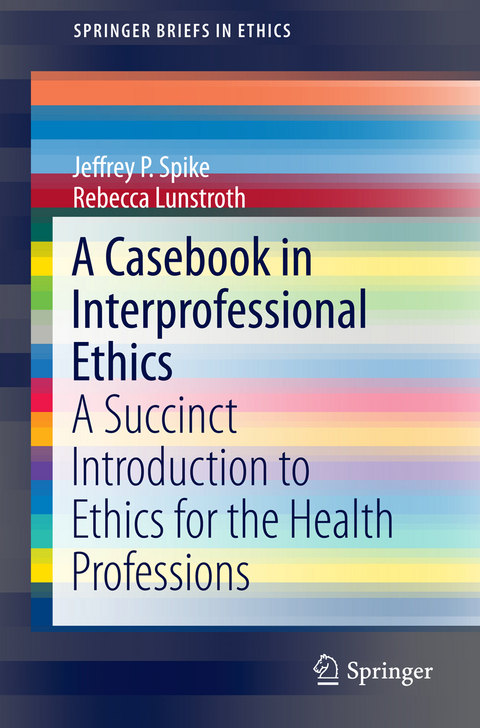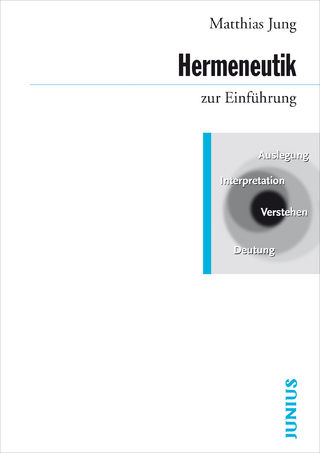
A Casebook in Interprofessional Ethics
Springer International Publishing (Verlag)
978-3-319-23768-8 (ISBN)
The first ethics casebook that integrates clinical ethics (medical, nursing, and dental) and research ethics with public health and informatics. The book opens with five chapters on ethics, the development of interprofessional ethics, and brief instructional materials for students on how to analyze ethical cases and for teachers on how to teach ethics. In today's rapidly evolving healthcare system, the cases in this book are far more realistic than previous efforts that isolate the decision-making process by professions as if each is not embedded in a larger context that involves healthcare teams, hospital policies, and technology. The central claim of this book is that ethics is an important common ground for all of the health professions. Furthermore, when we recognize that our professions converge upon a common goal we will find less conflict and more pleasure in working together.
Jeffrey Philip Spike, Ph.D., has been working full-time in medical education since receiving his Ph.D. in philosophy from the Johns Hopkins University in 1987. He joined the McGovern Center in 2009 as the Sam Karff Chair and the Director of the new Campus-Wide Ethics Program. The Campus-Wide Ethics Program is an initiative to enhance the ethics education at all six schools of the UTH Health Science Center, including a new emphasis on inter-professional education. Dr. Spike spent 15 years at the University of Rochester Medical Center, where he taught clinical ethics at the medical school and was Director of the Ethics Consultation Service at the affiliated teaching hospital, Strong Memorial.Dr. Spike has published over 50 articles, book chapters, book reviews, editorials, and commentaries in journals such as Annals of Internal Medicine, the Journal of Law, Medicine, and Ethics and the Journal of Clinical Ethics. He is on the Editorial Board of and a regular contributor to the American Journal of Bioethics, The Journal of Clinical Ethics, and Narrative Inquiry in Bioethics. He is frequently called upon to provide interviews to the media and has been interviewed by the New York Times, Los Angeles Times, Tampa Tribune, ABC News, AMA News, The Chronicle for Higher Education, and People Magazine and has appeared on Science Friday with Ira Flatow.In medical education, one of Dr. Spike’s interests has been the value of using films and TV shows to provide demonstrations and promote discussions of the complex social interactions behind ethical, organizational, and professional decisions. He has written articles and facilitator guides to The Doctor, Lorenzo’s Oil, Dax’s Case, Wit, and an episode of Scrubs.
Table of Contents; I. Introductory chapters.- Preface: Ways to Use This Book.- 1.A Very Brief History of Health Care Ethics: Four Decades from the Golden Age of Bioethics to the Dawn of Interprofessional Ethics.- 2.FramingInterprofessionalEthicsCases.- Introduction.- Interprofessionalism.- Different Levels of Ethical Issues in the Cases.- A Framework to Help Formulate Mature Ethical Judgments.- 3. Tools for understanding and analyzing ethics cases.- Introduction: What ethics is, what ethics isn't, and when it all began.- Ethical Theories.- The Two Modern Philosophical Theories of Ethics.- Four Less Rigorous Alternative Ethical Theories.- 4. Using Principles for understanding and analyzing ethics cases: The Original Four Principles.- Four Additional Mid-level Principles for Professionalism (and Professional Integrity).- Four Principles for Public Health.- 5. How to write essays, papers, and consults with valid and sound ethical arguments.- (including a grading matrix for teachers and students).- II. The cases.
| Erscheint lt. Verlag | 22.2.2016 |
|---|---|
| Reihe/Serie | SpringerBriefs in Ethics |
| Zusatzinfo | XVII, 89 p. |
| Verlagsort | Cham |
| Sprache | englisch |
| Maße | 155 x 235 mm |
| Themenwelt | Geisteswissenschaften ► Philosophie ► Allgemeines / Lexika |
| Geisteswissenschaften ► Philosophie ► Ethik | |
| Medizin / Pharmazie ► Allgemeines / Lexika | |
| Medizin / Pharmazie ► Zahnmedizin | |
| Schlagworte | alternative ethical theories • analyzing ethics cases • Biomedical Sciences • can ethics be taught? • Clinical Ethics • dentistry • ethics • ethics for future health professionals • four principles of analyzing ethics cases • Health Care Ethics • Humanities, Social Sciences and Law • interprofessional ethics • mature ethical judgments • Medicine and Public Health • Medicine/Public Health, general • nursing ethics • Public Health Ethics • research ethics • traditional clinical ethics |
| ISBN-10 | 3-319-23768-3 / 3319237683 |
| ISBN-13 | 978-3-319-23768-8 / 9783319237688 |
| Zustand | Neuware |
| Informationen gemäß Produktsicherheitsverordnung (GPSR) | |
| Haben Sie eine Frage zum Produkt? |
aus dem Bereich


